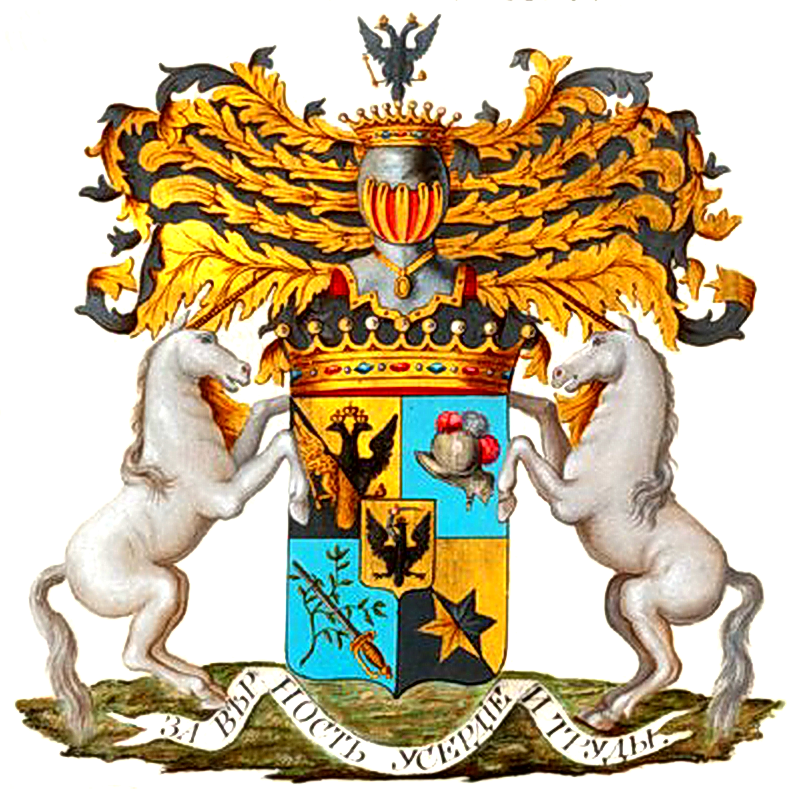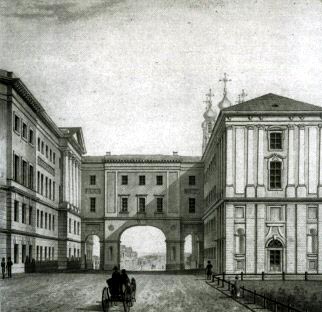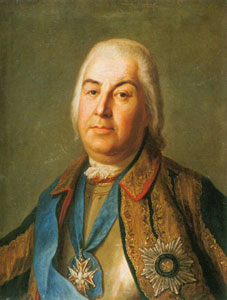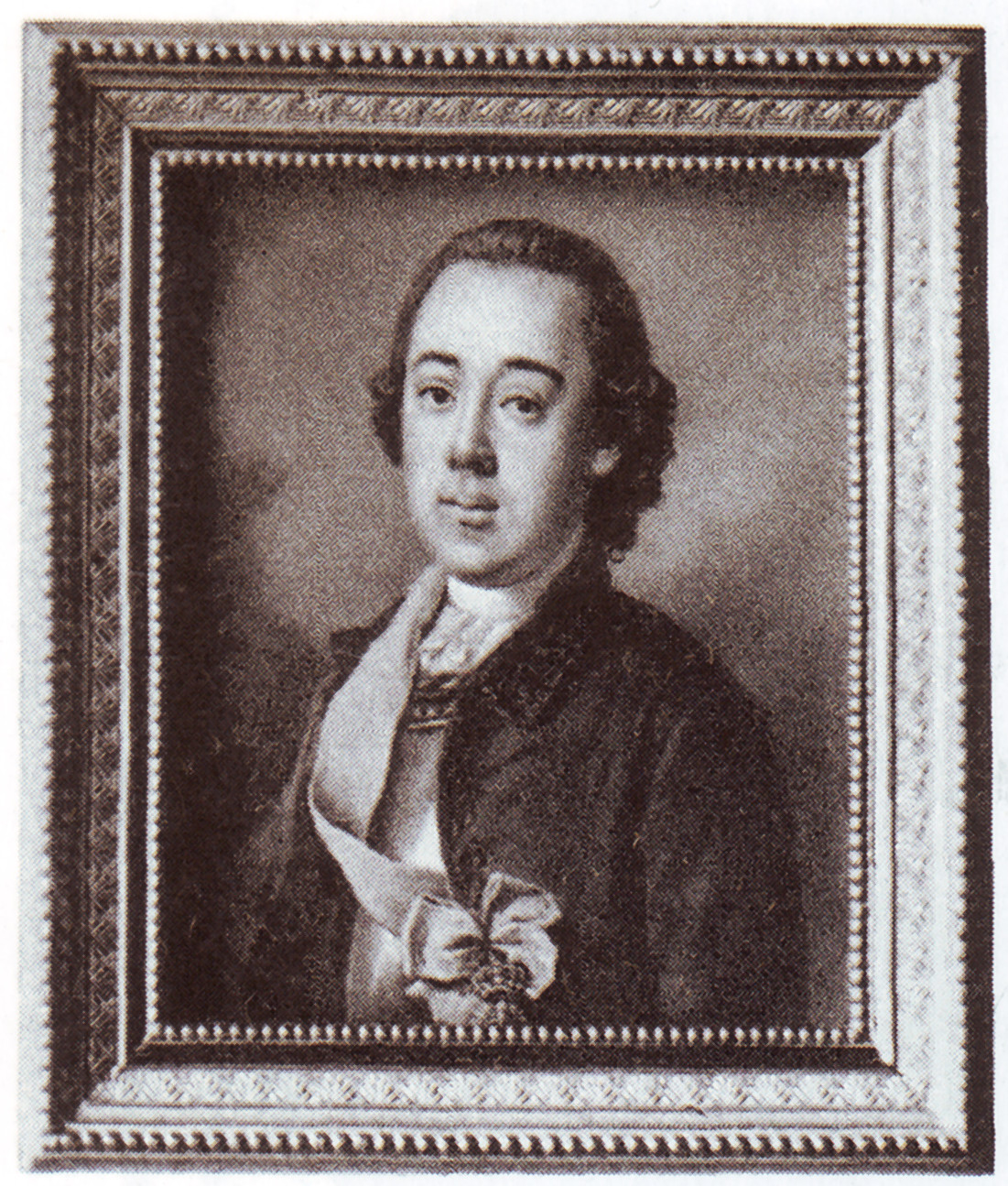|
Saltykov
The House of Saltykov ( rus, Салтыков, p=səltɨˈkof) is the name of an old Russian noble family which can trace their ancestry back to 1240. In March 1730 the family was awarded with the title of Count in Russia, granted to them by Empress Anna of Russia. Notable family members * Aleksey Saltykov (other), several people * Darya Nikolayevna Saltykova (1730–1801), Russian serial killer * Darya Petrovna Saltykova (1739–1802), Russian lady-in-waiting and socialite * Irina Saltykova (born 1966), Russian pop singer * Ivan Saltykov (1730–1805), Russian Field-Marshal * Mikhail Saltykov-Shchedrin (1826–1889), leading Russian satirist, known under his pen name ''Shchedrin'' * Nikolai Saltykov (1736–1816), Russian field marshal * Praskovia Saltykova (1664–1723), Tsarina, wife of Ivan V of Russia * Pyotr Saltykov (1698–1772), Russian statesman * Sergei Saltykov Count Sergei Vasilievich Saltykov ( rus, link=no, Сергей Васильевич Салт ... [...More Info...] [...Related Items...] OR: [Wikipedia] [Google] [Baidu] |
Mikhail Saltykov-Shchedrin
Mikhail Yevgrafovich Saltykov-Shchedrin ( rus, Михаи́л Евгра́фович Салтыко́в-Щедри́н, p=mʲɪxɐˈil jɪvˈɡrafəvʲɪtɕ səltɨˈkof ɕːɪˈdrʲin; – ), born Mikhail Yevgrafovich Saltykov and known during his lifetime by the pen name Nikolai Shchedrin ( rus, Николай Щедрин), was a major Russian writer and satirist of the 19th century. He spent most of his life working as a civil servant in various capacities. After the death of poet Nikolay Nekrasov, he acted as editor of a Russian literary magazine '' Otechestvenniye Zapiski'' until the Tsarist government banned it in 1884. In his works Saltykov mastered both stark realism and satirical grotesque merged with fantasy. His most famous works, the family chronicle novel '' The Golovlyov Family'' (1880) and the political novel ''The History of a Town'' (1870) became important works of 19th-century fiction, and Saltykov is regarded as a major figure of Russian literary Realism. ... [...More Info...] [...Related Items...] OR: [Wikipedia] [Google] [Baidu] |
Darya Nikolayevna Saltykova
Darya Nikolayevna Saltykova ( rus, Да́рья Никола́евна Салтыко́ва; , Ива́нова; March 11, 1730 – December 27, 1801), commonly known as Saltychikha ( rus, Салтычи́ха, p=səltɨˈt͡ɕixə), was a Russian noblewoman, sadist, and serial killer from Moscow. She became notorious for torturing and killing many of her serfs, mostly females. Saltykova has been compared by many to the Hungarian "Blood Countess," Elizabeth Báthory (1560-1614), who allegedly committed similar crimes in her home, Čachtice Castle, against servant girls and local serfs, although historians debate the accuracy of these charges. Early life Darya Nikolayevna Saltykova was born into a rich and ancient Russian noble family. Her father was Nikolai Avtonomovich Ivanov and her mother Anna Ivanovna Davydova. Marriage and family Darya Nikolayevna Saltykova married the nobleman Gleb Alexeyevich Saltykov, uncle of Nikolai Saltykov, member of the famous Saltykov fami ... [...More Info...] [...Related Items...] OR: [Wikipedia] [Google] [Baidu] |
Pyotr Saltykov
Count Pyotr Semyonovich Saltykov (russian: Пётр Семёнович Салтыков) (11 December 1697/1698/1700 – 26 December 1772) was a Russian statesman and a military officer, promoted to the rank of Field marshal on 18 August 1759. Early life Saltykov was born in Russia in the village of Nikolskoye, southwest to the Lake Nero, the son of Semyon/Semjon Andreievich Saltykov (10 April 1672 - 1 October 1742), a landowner of an ancient Boyar family which rivalled the Romanovs in nobility and was descended from a sister of the first Romanov Tsar, and wife Fekla Jakowlevna Wolynskaya. He had a younger brother, Count Vladimir Semyonovich Saltykov (6 August 1705 - 5 January 1751). He was a distant cousin of Sergei Vasilievich Saltykov, first lover of Catherine the Great, and was also related to Praskovia Fyodorovna Saltykova. Life The year of his birth is uncertain. It is estimated as between 1697 and 1700, as in 1714 he was sent by Peter the Great to France to maste ... [...More Info...] [...Related Items...] OR: [Wikipedia] [Google] [Baidu] |
Nikolai Saltykov
Count, then Prince Nikolay Ivanovich Saltykov (russian: Николай Иванович Салтыков, 31 October 1736 – 28 May 1816), a member of the Saltykov noble family, was a Russian Imperial Field Marshal and courtier best known as the tutor of the eventual Tsar Paul I of Russia and his two sons, Constantine and Alexander. He was the head of the Russian Army as the president of the War Collegium in 1791–1802. He was also the interim head (Lieutenant Grand Master) of the Order of Malta between 1801 and 1803. Life His parents were general Ivan Alexeyevich Saltykov (himself the nephew of Anna I of Russia) and countess Anastasia Petrovna Tolstoy. He spent a short time in the Semyonovsky Regiment, of which he became a permanent member in 1748. In 1747, he and his father took part in the Russian advance to the River Rhine. During the Seven Years' War he distinguished himself in several battles against Prussian forces. After the victory at Kunersdorf over Fre ... [...More Info...] [...Related Items...] OR: [Wikipedia] [Google] [Baidu] |
Praskovia Saltykova
Praskovia Fyodorovna Saltykova (russian: Прасковья Фёдоровна Салтыкова; 12 October 1664 – 13 October 1723) was the tsaritsa of Russia as the only wife of joint-Tsar Ivan V of Russia. She was the mother of Empress Anna of Russia. She played an important part as the most senior woman of the Russian court in 1698–1712. Life Praskovia Fyodorovna was by birth member of an old Saltykov family. Born as an elder daughter of and of a certain Yekaterina Fyodorovna or of Anna Mikhailovna Tatischeva Empress The marriage of Ivan V was arranged by his sister, the regent Sophia, who wished to ensure the next heir to the throne through Ivan and his faction of the family rather than from his half brother and co-Tsar, Peter. Sophia was at the time the ruler of Russia in place of the two Tsars: the underage Peter and the mentally challenged Ivan. Reportedly, Prince Vasily Golitsyn advised Sophia that when Ivan V had a son, she could appoint Ivan's son to be his c ... [...More Info...] [...Related Items...] OR: [Wikipedia] [Google] [Baidu] |
Ivan Saltykov
Count Ivan Petrovich Saltykov (russian: Иван Петрович Салтыков; 28 June 1730 – 14 November 1805) was a Russian Field Marshal, the Governor-General of Moscow from 1797 to 1804, and owner of the grand estate of Marfino. Biography Ivan was the only son of Field-Marshal Pyotr Semyonovich Saltykov. He began military service at the age of 15 in the Semenovsky Regiment at the rank of private. In 1758 he was inducted into the Imperial Court at the junior rank of Kamer-Junker. During the Seven Years' War Saltykov distinguished himself at the capture of both Königsberg and Elbing, and at the Battle of Zorndorf. After the onset of peace he received a promotion to major general and was decorated with the Order of St. Anna, 2nd class by Peter III. At Catherine the Great's coronation, he was awarded the Order of St. Alexander Nevsky. At the start of the Russo-Turkish War of 1768–1774 the now Lieutenant-General Saltykov served under the command of Rumyantsev ... [...More Info...] [...Related Items...] OR: [Wikipedia] [Google] [Baidu] |
Irina Saltykova
Irina Ivanovna Saltykova (''née'' Sapronova, russian: Ирина Ивановна Салтыкова (Сапронова), , born 5 May 1966) is a Russian pop singer and a former member of the music group Mirage, which was popular in Russia in the 1990s. She released six albums and four singles. Saltykova also did some acting, particularly in the film ''Brother 2''. In June 2000, Saltykova was featured in Russian ''Playboy''. Life Irina Ivanovna Sapronova was born in the city of Donskoy, Tula Oblast, in the then Soviet Union. During school years she successfully engaged in artistic gymnastics. Sapronova also attended cutting, sewing and knitting classes. In 1985, she graduated from the Civil Engineering College, and in 1990, from the Moscow Civil Engineering Institute. In 1985, Sapronova met her future husband, singer Viktor Saltykov in Sochi. In 1987, Saltykova gave birth to a daughter, Alisa. In the beginning of the 1990s Saltykova's marriage broke apart. In 1994, Saltykova deb ... [...More Info...] [...Related Items...] OR: [Wikipedia] [Google] [Baidu] |
Sergei Saltykov
Count Sergei Vasilievich Saltykov ( rus, link=no, Сергей Васильевич Салтыков, p=sʲɪrˈɡʲej vɐˈsʲilʲjɪvʲɪtɕ səltɨˈkof; c. 1726 – 1765) was a Russian officer ( chamberlain) who became the first lover of Empress Catherine the Great after her arrival in Russia. Life Saltykov was alleged to be the biological father of Catherine II's son, Paul I of Russia, and this was heavily implied in Catherine's memoirs. It was reported that Paul was "almost certainly the child of atherine'slover." However, Paul greatly resembled his official father Peter III of Russia in character and appearance. There was very little in common between the pugnacious, stocky Paul and tall, handsome Sergei Saltykov. In her memoirs, though, Catherine noted the "ugliness" of Saltykov's brother.Montefiore, Sebag, ''The Prince of Princes: The Life of Potemkin'', (St. Martin's Press) New York, NY, 2000. The Saltykovs were an ancient boyar family which rivaled the Romanovs i ... [...More Info...] [...Related Items...] OR: [Wikipedia] [Google] [Baidu] |
Aleksey Saltykov (other) , a Russian masculine surname
{{hndis, Saltykov, Aleksey ...
Aleksey/Alexey/Alexei Saltykov may refer to: *Alexey Saltykov (director) (1934–1993), Soviet and Russian film director * Alexey Saltykov (1806–1859), Russian traveller, writer and artist * , Governor of Moscow (1713–1716) and Governor of Kazan (1719–1725) See also *Saltykov The House of Saltykov ( rus, Салтыков, p=səltɨˈkof) is the name of an old Russian noble family which can trace their ancestry back to 1240. In March 1730 the family was awarded with the title of Count in Russia, granted to them by Empre ... [...More Info...] [...Related Items...] OR: [Wikipedia] [Google] [Baidu] |
Darya Petrovna Saltykova
Countess Darya Petrovna Saltykova (née Countess Chernyshyova; ; 20 September 1739 – December 23, 1802), was a Russian lady in waiting, socialite and noble and Dame of the Order of St. Catherine's first degree. She was the sister of the lady in waiting Princess Nataliya Petrovna Chernysheva, and in 1769 married to Field Marshal Count Ivan Petrovich Saltykov. Life The eldest daughter of a diplomat, Count Peter G. Chernyshev, godson of Peter the Great, and many believed to be for his son, and Catherine Andreevna, daughter of a famous chief of the secret office in Biron, Count Andrei Ivanovich Ushakov. She spent her early life abroad with her father, and upon her return in 1762, she and her sister became known as two of the most learned women in Russia. In 1762, she was appointed maid of honor to Empress Catherine the Great. She participated in the famous court masquerade of 1766 and at the great amateur theatre performance of 1768, where she was given much attention. After h ... [...More Info...] [...Related Items...] OR: [Wikipedia] [Google] [Baidu] |
Anna Of Russia
Anna Ioannovna (russian: Анна Иоанновна; ), also russified as Anna Ivanovna and sometimes anglicized as Anne, served as regent of the duchy of Courland from 1711 until 1730 and then ruled as Empress of Russia from 1730 to 1740. Much of her administration was defined or heavily influenced by actions set in motion by her uncle, Peter the Great (), such as the lavish building projects in St. Petersburg, funding the Russian Academy of Science, and measures which generally favored the nobility, such as the repeal of a primogeniture law in 1730. In the West, Anna's reign was traditionally viewed as a continuation of the transition from the old Muscovy ways to the European court envisioned by Peter the Great. Within Russia, Anna's reign is often referred to as a "dark era". Early life Anna was born in Moscow as the daughter of Tsar Ivan V by his wife Praskovia Saltykova. Ivan V was co-ruler of Russia along with his younger half-brother Peter the Great, but he was ment ... [...More Info...] [...Related Items...] OR: [Wikipedia] [Google] [Baidu] |
Russian Nobility
The Russian nobility (russian: дворянство ''dvoryanstvo'') originated in the 14th century. In 1914 it consisted of approximately 1,900,000 members (about 1.1% of the population) in the Russian Empire. Up until the February Revolution of 1917, the noble estates staffed most of the Russian government and possessed a Gentry assembly. The Russian word for nobility, ''dvoryanstvo'' (), derives from Slavonic ''dvor'' (двор), meaning the court of a prince or duke ('' kniaz''), and later, of the tsar or emperor. Here, ''dvor'' originally referred to servants at the estate of an aristocrat. In the late 16th and early 17th centuries, the system of hierarchy was a system of seniority known as '' mestnichestvo''. The word ''dvoryane'' described the highest rank of gentry, who performed duties at the royal court, lived in it (''Moskovskie zhiltsy''), or were candidates to it, as for many boyar scions (''dvorovye deti boyarskie'', ''vybornye deti boyarskie''). A nobleman ... [...More Info...] [...Related Items...] OR: [Wikipedia] [Google] [Baidu] |





